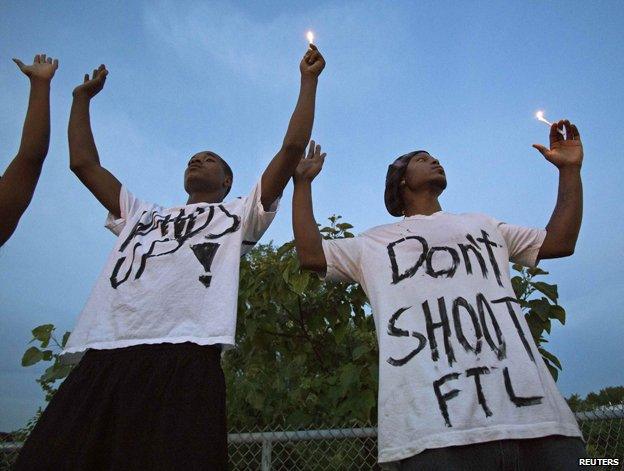Teenagers and the news game
- Published
- comments

Any parent of a teenager, particularly one of the male variety, will know that their conversation can be, well, limited. So my wife was surprised earlier this week when our 16-year-old son suddenly asked her what she thought about "this terrible stuff that's been happening in Ferguson".
There followed an apparently well informed account of events in the US town where a young black man had been shot dead by police. She went on to discuss with him America's troubled past when it came to race relations, and more words came tumbling from this often monosyllabic young man.
Now, at the time of their discussion coverage in the UK mainstream media of the Ferguson story had been pretty sparse. In any case, our son watches barely any television and certainly does not read newspapers. Neither is he much of a user of social networks, having abandoned Facebook as "boring" and never joined Twitter. So where has he got his information?
"From friends in games, and from games forums," he explains. He does spend a lot of time online playing what seem to be very sociable games - League of Legends for instance - where live chat to other players is an important feature. He says many of his online friends are American and they have been talking about events in Ferguson. They share links to news stories and he has also found that gaming forums are full of chatter about it.

A candle-lit vigil in the US town of Ferguson
This all set me thinking about the fast changing landscape that often seems a threat to the future of journalism. This week, for instance, the viral news-and-cats site Buzzfeed got a $50m investment from one of Silicon Valley's leading venture capital funds, and now has a valuation higher than old media giants like the Washington Post. (This, by the way is a subject we'll discuss on today's edition of Tech Tent).
So is my anecdote good or bad news for the future of journalism? The positive side is that a 16-year-old - and many like him - is probably better informed this week about some global events than many older people who rely exclusively on the mainstream media.
But, I hear you ask, what is the quality of the news he is absorbing - isn't it just a load of ill-informed internet gossip and social media backchat? Drilling down into what he actually read about Ferguson, it appears that much of it was on good old-fashioned news sites and written by professional journalists, perhaps even those working for the Washington Post, whose reporter was arrested by police in Ferguson this week.
But how much longer will those journalists still be in jobs? The internet and indeed much of mainstream media is very good at opinion, instant analysis, and fast reports of breaking events. It is much less proficient in the often dull and expensive business of putting reporters on the ground everywhere from local council meetings to warzones to gather informed accounts of complex events.
New media platforms like Buzzfeed and Vice will protest - with some justification - that they are now investing in journalism rather than simply repackaging other people's work. But the scope of that investment still looks very limited. Will Buzzfeed keep a reporter in Gaza, in Ukraine, even in smalltown America for years on end?
Two conclusions then. Let's not be too depressed about teenagers and news because they are getting plenty of it, just via different means than their parents. But the challenge for journalists is to find new ways of reaching them while building a reputation as trusted guides to what is happening in the world. And, as we know, "trust" and "journalist" is not an obvious piece of word association for many people these days.